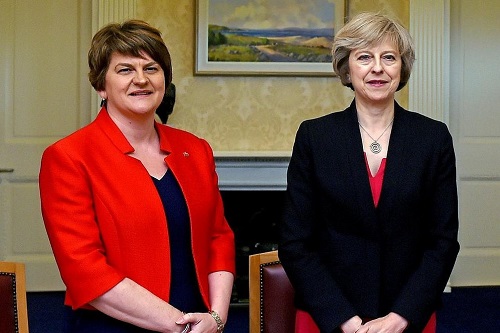flickr photo
By
Tom Arms
Most people thought that Ireland would vote in favour of abortion. In the past two decades it has changed from a poor church-dominated society into a vibrant liberal European democracy.
But the size of the pro-choice lobby was astonishing. Two-thirds of the Irish electorate voted in favour of abortion.
This does not, however, mean that every woman on the Emerald Isle can now choose to have an abortion. The six counties that make up Northern Ireland, the part that remains in the United Kingdom, still ban abortion. And this is creating a big problem for Britain’s hard-pressed Prime Minister Theresa May.
Abortion, except in rare cases, is banned in Northern Ireland because it is possibly the only issue on which the socially conservative Protestant and Roman Catholic churches can agree. And at the moment, Mrs May’s government is in power because of Northern Ireland’s Protestant Democratic Unionist Party (DUP), whose leader, Arlene Foster, has said: “There will be no abortion in Northern Ireland.”
The Northern Ireland abortion law does allow abortion if the woman’s life is at risk or if there is a risk of permanent and serious damage to her mental health. It does not allow abortion in cases of rape, incest or if there is a likelihood of a seriously disabled child. The penalty for having an abortion is life imprisonment.
Constitutionally speaking, Mrs May can ignore the DUP leader. Because of the failure of the DUP and Sinn Fein to agree on a power-sharing government, the troubled province is currently being ruled by Westminster. But, of course, if the British Prime Minister uses that power she loses the support of the DUP and her government would collapse.
But then it might collapse anyway over the abortion issue. Mrs May is also facing opposition from feminists in her ruling Conservative Party who are demanding that the Prime Minister follow the Irish lead and force the six counties into the 21st century. Many of the same women are opposed to Brexit, so they now have two reasons for dropping their support of the prime minister.
Mrs May says she is a feminist and one of the touchstone policies of feminists worldwide is pro-choice laws on abortion. Shadow Attorney General Shami Chakrabarti said: “The PM is a self-identifying feminist and the test of feminists is whether they stick up for all women.”
Mrs May has made some moves to ease the impact of the Northern Ireland abortion law. Last year her government provided money for financially-pressed pregnant Northern Ireland women to travel to England for free abortions on the NHS.
England has had free abortions since 1967. At the time Northern Ireland had a devolved government dominated by Ulster Unionists. Its powers included control of the abortion law. The socially and politically conservative Ulster Unionists refused to even consider abortion.
The collapse of the Northern Ireland government in 1972 introduced direct rule from Westminster. This was an opportunity to extend English abortion law to the six counties. But by then the British government was walking a political and military tightrope between the Catholic and Protestant communities and was wary of forcing any controversial social changes on the Northern Irish community. So the issue was kicked into the long grass and forgotten until this week’s referendum in Southern Ireland.
There is, however, a possibility that Mrs May’s government may be rescued from its dilemma by a case expected to be heard before the end of the year by the UK Supreme Court. It is being brought by the Northern Ireland Human Rights Commission and argues that the current ban on abortion is incompatible with international human rights and is “inhuman and degrading” to women and girls.
If the Supreme Court agrees with the premise than Mrs May can heave a sigh of relief. If it doesn’t, then she has real problems.
Tom Arms
I am a journalist, entrepreneur and historian with extensive experience in print, web and broadcast journalism. I started as a diplomatic correspondent, wrote several books (The Falklands Crisis, World Elections On File and the Encyclopedia of the Cold War), and then in 1987 started my own business (Future Events News Service, www.fensinformation.com) which over 25 years established itself as the world and UK media’s diary. Our strapline was: “We set the world’s news agenda.” I sold FENS in December 2012 but retained the exclusive broadcast rights to all of FENS data. To exploit these rights I set up LookAhead TV which produces unique programmes which “Broadcasts Tomorrow Today” so that viewers can “Plan to Participate.” LookAhead has appeared regularly on Vox Africa, Radio Tatras International, The Conversation and Voice of Africa Radio.
In addition to being a syndicated broadcaster and columnist on global affairs, Tom is also available for speaking engagements and can be contacted on Twitter, Linkedin and email: [email protected].



No Comments Yet!
You can be first to comment this post!